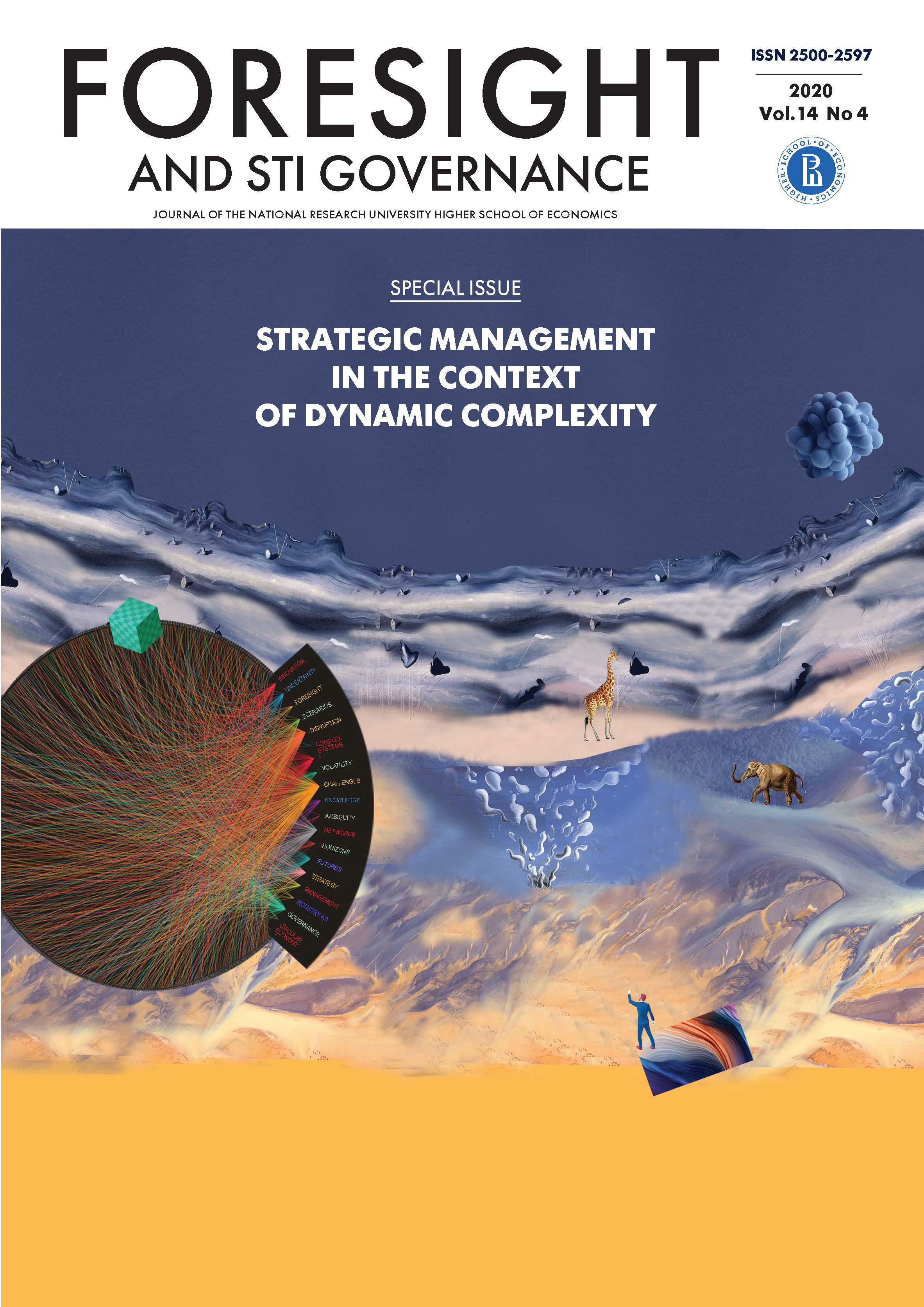Abstract
In the context of technological and social changes, business faces the challenges of a more complex operating environment. New business models are required that take into account an unprecedentedly wide range of emerging factors. Among such approaches, an integral model stands out, which allows one to adapt to a new level of development of society and master a new context. The approaches to the development of an integral model are still in the process of formation, since a deeper study of the modern network society, its values, guidelines, and preferences is required. Taking into account such complexity requires non-linear approaches and thinking in terms of complex, dynamic systems. From this point of view, when interacting with the increasingly complex environment, it is advisable for companies to view themselves as an element of a large-scale system of horizontal, social ties, in which the idea of social responsibility acquires new meanings.It is especially difficult to implement integral approaches within the framework of traditional thinking due to the variety and multi-layered factors that change the context of companies' activities. The transformation of corporate governance and approaches to social responsibility is a non-linear process driven by a chain of events related to changes in consumer behavior and other aspects. Such exponential changes are characterized by profound and cumulative consequences, radically changing the spheres of activity, social relations, and institutions. This article demonstrates the case of a company that, despite the difficulties, managed to implement a similar approach and maintain a dynamic pace of development.
References
Boons F., Ludeke-Freund F. (2013) Business model for sustainable innovation: state-of-the-art and steps toward a research agenda // Journal of Cleaner Production. Vol. 45. P. 9-19. DOI: https://doi.org/10.1016/j.jclepro.2012.07.007
Deloitte (2018) Deloitte Millennial Survey. Millennials Disappointed in Business Unprepeared for Industry 4.0. Режим доступа: https://www2.deloitte.com/content/dam/Deloitte/global/Documents/About-Deloitte/gx-2018-millennial-survey-report.pdf, дата обращения 26.06.2020.
Deloitte (2019) The Deloitte Global Millennial Survey 2019. Societal Discord and Technological Transformation Create a Generation Disrupted. Режим доступа: https://www2.deloitte.com/global/en/pages/about-deloitte/articles/millennialsurvey, дата обращения 26.06.2020.
Drucker P.F. (1994) The Theory of the Business // Harvard Business Review. Vol. 72 (September-October). P. 95-104.
FRC (2018) UK Corporate Governance Code. London: Financial Reporting Council. Режим доступа: https://www.frc.org.uk/getattachment/88bd8c45-50ea-4841-95b0-d2f4f48069a2/2018-UK-Corporate-Governance-Code-FINAL.pdf, дата обращения 06.01.2020.
GSIA (2019) Global Sustainable Investment Review. Global Sustainable Investment Alliance Report 2019. Brussels, Sydney, London, Utrecht, Washington D.C.: Global Sustainable Investment Alliance Режим доступа: http://www.gsi-alliance.org/wp-content/uploads/2019/03/GSIR_Review2018.3.28.pdf, дата обращения 30.10.2019.
Gallup (2016) How Millennials Want to Work and Live. Режим доступа: https://www.gallup.com/workplace/238073/millennials-work-live.aspx, дата обращения 26.06.2020.
Geissdoerfer M., Vladimirova D., Evans S. (2018) Sustainable business model innovation: A review // Journal of Cleaner Production. Vol. 198. P. 401-416. DOI: https://doi.org/10.1016/j.jclepro.2018.06.240
Goleman D. (2019) Millennials: The purpose generation. Режим доступа: https://www.kornferry.com/institute/millennials-purpose-generation, дата обращения 26.06.2020.
Hellsten S., Mallin Ch. (2006) Are Ethical or Socially Responsible Investments Socially Responsible?// Journal of Business Ethics. Vol. 66. № 4. P. 393-406. DOI: https://doi.org/10.1007/s10551-006-0001-x
Johnson M.W., Christensen C.M., Kagermann H. (2008) Reinventing Your Business Model // Harvard Business Review. Vol. 87 (December). P. 52-60.
Laroche M., Bergeron J., Barbaro-Forleo G. (2001) Targeting consumers who are willing to pay more for environmentally friendly products // Journal of Consumer Marketing. Vol. 18. № 6. P. 503-520. DOI: https://doi.org/10.1108/EUM0000000006155
Michalak R. (2019) The key metric is how Ben & Jerry's measures success // Fast Company. 01.05.2019. Режим доступа: https://www.fastcompany.com/90287777/this-key-metric-is-how-ben-jerrys-measures-success, дата обращения 26.06.2020.
Michel J.B., Shen Y.K., Aiden A.P., Veres A., Gray M.K. (2011) Quantitative Analysis of Culture using Millions of Digitized Books // Science. Vol. 331. № 6014, pp. 176-182. DOI: https://doi.org/10.1126/science.1199644
OECD (2020) Tackling Coronavirus (COVID-19). Contributing to a Global Effort. COVID-19 and Responsible Business Conduct. Paris: OECD. Режим доступа: http://www.oecd.org/coronavirus/policy-responses/covid-19-and-responsible-business-conduct-02150b06/, дата обращения 02.06.2020.
Page M., Spira L.F. (2016) Corporate governance as custodianship of the business model // Journal of Management and Governance. Vol. 20. № 2. P. 213-228. DOI: https://doi.org/10.1007/s10997-016-9343-7
Pine II B.J., Gilmore J.H. (1998) Welcome to the experience economy // Harvard Business Review (July-August). P. 97-105.
Porter M.E. (1996) What is the strategy? // Harvard Business Review. Vol. 74 (November-December). P. 61-78.
Schwab K. (2019) Davos Manifesto 2020: The Universal Purpose of a Company in the Fourth Industrial Revolution. Geneva: World Economic Forum. Режим доступа: https://www.weforum.org/agenda/2019/12/davos-manifesto-2020-the-universal-purpose-of-a-company-in-the-fourth-industrial-revolution/ дата обращения 02.06.2020.
Subramanian G. (2015) Corporate Governance 2.0 // Harvard Business Review. Vol. 93. № 3. Р. 96-105.
Upward A., Jones P.H. (2015) An ontology for strongly sustainable business models: Defining an enterprise framework compatible with natural and social science // Organization & Environment. Vol. 29. № 1. P. 97-123. DOI: https://doi.org/10.1177/1086026615592933
Van der Elst Ch., Vermeulen E.P.M. (2011) Corporate Governance 2.0: Assessing the Corporate Governance Green Paper of the European Commission // European Company Law. Vol. 8. № 4. P. 165-174. Режим доступа: https://research.tilburguniversity.edu/en/publications/corporate-governance-20-assessing-the-green-paper-of-the-european, дата обращения 06.01.2020.
Visser W. (2011) CSR 2.0: Transforming the Role of Business in Society // Social Space. № 4. P. 26-35. Режим доступа: https://ink.library.smu.edu.sg/lien_research/87/, дата обращения 06.01.2020.
WEF (2020) COVID Action Plan. Stakeholder principles in the COVID era. Geneva: World Economic Forum. Режим доступа: http://www3.weforum.org/docs/WEF_Stakeholder_Principles_COVID_Era.pdf, дата обращения 02.06.2020.
Миловидов В.Д. (2015a) Управление инновационным процессом: как эффективно использовать информацию // Нефтяное хозяйство. № 6. C. 10-16.
Миловидов В.Д. (2015b) Управление рисками в условиях асимметрии информации: отличай отличимое // Мировая экономика и международные отношения. № 8. С. 14-24.
Миловидов В.Д. (2017) Информационная асимметрия и большие данные: грядет ли пересмотр парадигмы финансового рынка? // Мировая экономика и международные отношения. Т. 61. № 3. C. 5-14.
Миловидов В.Д. (2019) Симметрия заблуждений: факторы неопределенности финансового рынка в условиях технологической революции. М.: Магистр.

This work is licensed under a Creative Commons Attribution 4.0 International License.

